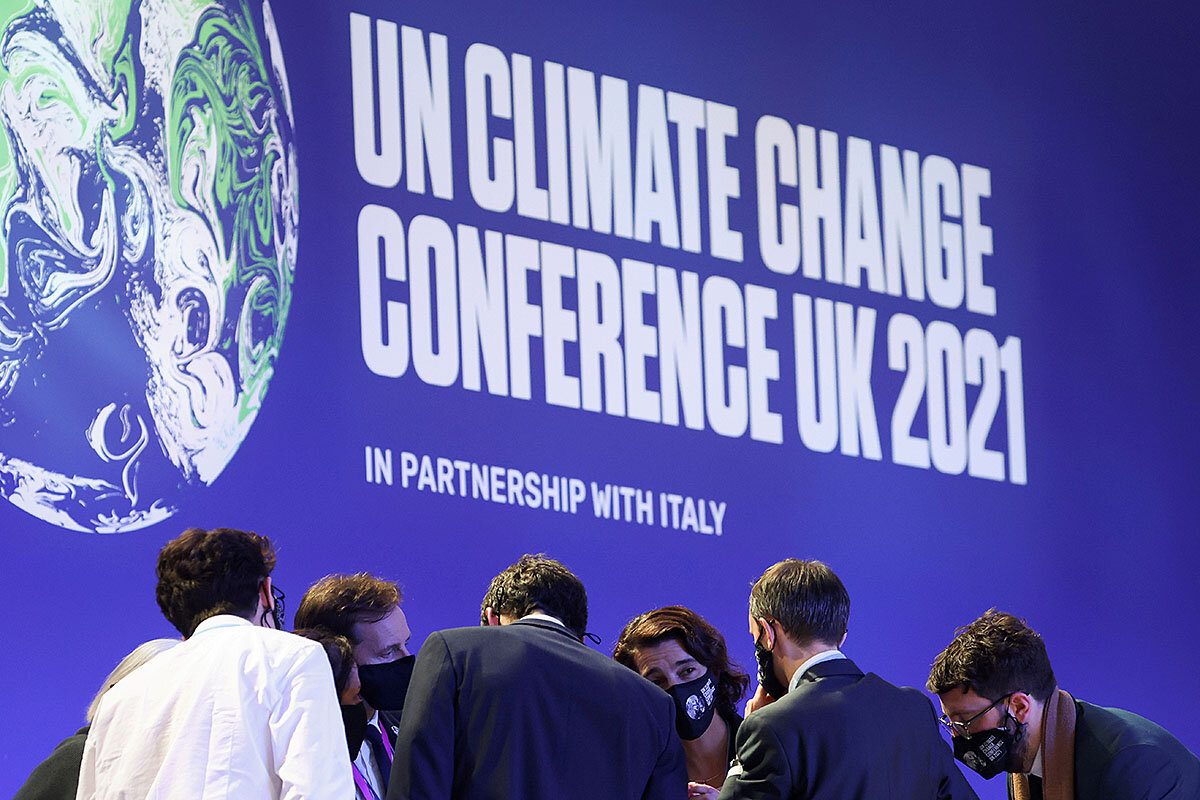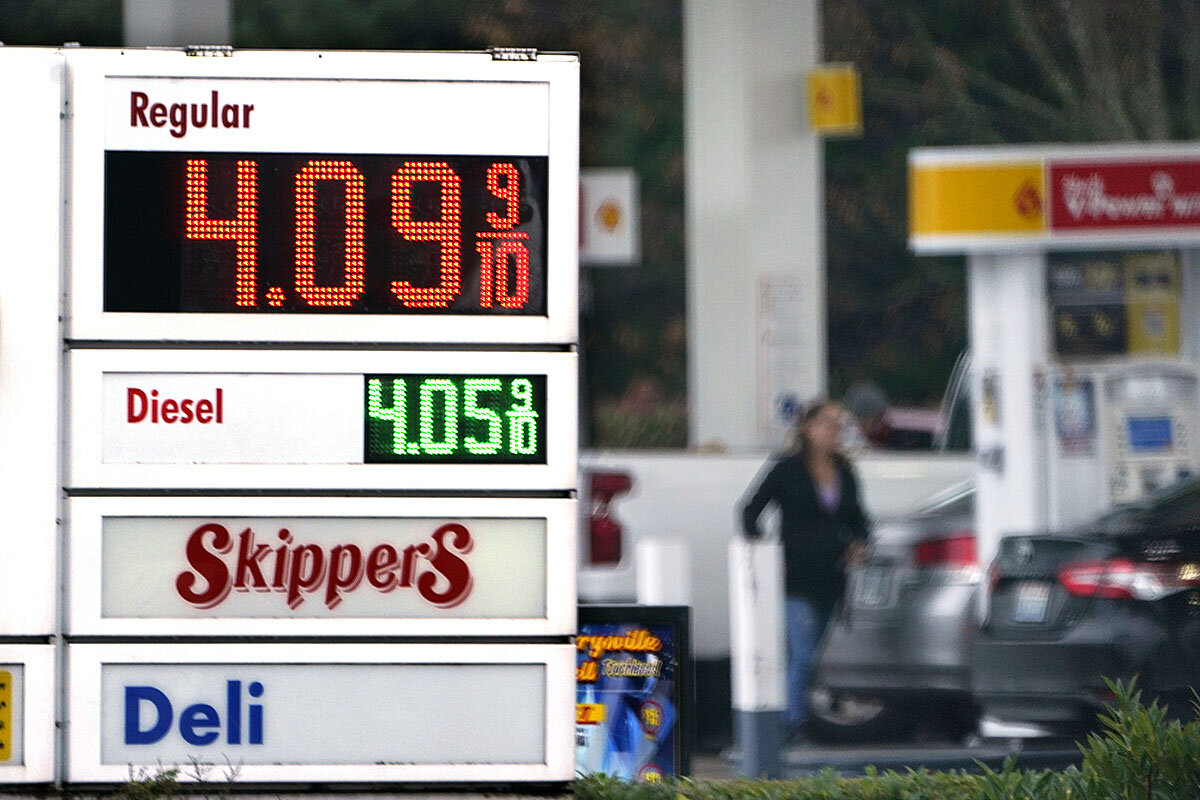Climate worry meets gas-price anxiety. Can US really ditch fossil fuels?
Loading...
| Texas City, Texas
Michael Day has made a good life for himself as a laborer in the oil and gas industry. He’s just 25 years old, and he’s worked as an industrial mechanic in refineries since he was 18, fresh out of high school – a job that’s given Mr. Day, his wife, and their children a comfortable life so far.
He has plans for their future, too. Mr. Day intends to continue this work until perhaps his late 40s, when he plans to retire early. His earnings have recently allowed him to purchase a small plot of land near his home in Texas City, Texas, where he’s gradually building an RV park he’ll rent to travelers.
It’ll be his turn to kick back “and make money,” Mr. Day says.
Why We Wrote This
The long-mighty oil industry is under pressure due to climate change. Yet concerns about energy-price inflation reveal public ambivalence. It’s a reminder that reliance on fossil fuels remains large, and the weaning process won’t be easy.
Even as the threat posed by climate change has prompted insistent calls for the world to wean itself from fossil fuels, there’s little reason to think Mr. Day’s plan is implausible. The outlook – attested by recent global outcries over gasoline prices or natural gas shortages – is that the world remains heavily reliant on fossil fuels. Even with ambitious environmental policies, the weaning will take decades.
Yet for the industry itself, this isn’t exactly a kick-back-and-make-money scenario. Investor appetite for oil stocks is ebbing. Clean-energy incentives and other government policies are nudging Big Oil toward a smaller future. And from lawsuits to leaked documents, the industry faces the possibility of being held liable for its role in human-caused climate change.
Add it all up, and these opposing trends may signal a central challenge for the years ahead: To stabilize Earth’s temperatures will require concerted efforts not just to replace fossil fuels, but also to mitigate potential economic disruption during the transition.
For oil companies, it’s an era in which ongoing demand for their products belies a future that’s as murky as the bottom of a barrel of crude.
“The industry’s whole objective is to delay, and that’s what they’ve spent the past three or four years doing. They’re running out of delay tactics, but they’re the world’s greatest delay artist,” says Richard Wiles, executive director of the Center for Climate Integrity in Washington, D.C.
Rising pressure due to climate change
He is referring to how states such as Delaware, New York, and Minnesota, among others, have filed lawsuits against oil companies alleging they misled consumers and investors in the role their products have played in environmental degradation and the climate crisis.
Other flags of uncertainty:
- A recent by Harvard University signals a wider pullback by investors. U.S. oil stocks as a group have been sharply underperforming the broader stock market since 2014, down more than 40% in value while the S&P 500 index is up 150%.
- In Congress, several lawmakers likened a recent hearing – in which oil CEOs denied that their companies deceived the public on climate change – to the way tobacco executives said they didn’t believe nicotine was addictive in 1994. The last month by issuing subpoenas for documents from the oil companies.
- At the close of a November climate summit in Scotland, parties to the Paris climate agreement issued a statement that for the first time named fossil fuels as a driver of global warming.
Inflation anxiety, starting at the gas pump
But then there’s the flip side of all this: ongoing public reliance on those fuels for heating homes, running factories, and especially powering transportation.
“Right now, I will do what needs to be done to reduce the price you pay at the pump,” President Joe Biden said at the White House on Nov. 23, as he announced an unusual move to release stockpiles from the U.S. Strategic Petroleum Reserve.
Gasoline prices have surged this year as supply failed to keep pace with demand, contributing to wider inflation worries in a reviving economy.
The Biden administration said its temporary effort to ease pump prices needn’t conflict with the long-term goal of curbing greenhouse gas emissions. But at the very least, the current situation signals what could remain a difficult balancing act for years to come. Higher fuel prices are seen by many economists as a way to nudge consumers away from petroleum. Yet those same high prices .����
Gas prices have eased since Mr. Biden’s announcement last month, yet they remain nearly $1 per gallon higher than a year ago. And Mr. Biden’s favorability rating has sagged amid public concern about inflation and the pandemic, among other factors.
Ambivalence in public thought
Opinion polls reflect the tug and pull of competing priorities. Some 53% of Americans said they want less offshore oil drilling (versus 14% who wanted more, and 32% for no change), according to a by The Washington Post and the Kaiser Family Foundation.
Yet polls this year show high concern about gasoline prices. And worldwide, many see natural gas as an attractive energy source – it’s often called a “bridge fuel” for the transition toward cleaner energy. A 2020 Pew Research Center survey found that a median of 69% of adults in 20 nations , compared with a median of 39% of adults in those countries who favor expanding oil.
Some experts say the era of decline for U.S. oil production has been underway for years.
“The real transition was in the 1970s,” says Tyler Priest, an associate professor at the University of Iowa who studies the history of oil and gas drilling. Since then, he says, the domestic oil industry “hasn’t been able to replace and add to their reserves in the way they had.”
It took the fracking boom since 2008, using hydraulic fracturing technology to reach hard-to-access reserves, to change that.����
U.S. oil companies are “still in the technological vanguard,” Dr. Priest says. “They have the project management, the engineering, the geophysical expertise, and the long institutional history of doing major projects, like deep-water platforms. They still have the human resources and the technology that makes them important players.”
That, plus their installed base of production, suggests some staying power. Dr. Priest calculates that three large deep-water platforms in the Gulf of Mexico – Shell’s Appomattox and BP’s Thunder Horse and Atlantis – produce as much energy as 60,000 wind turbines covering 12,000 square miles.
Smooth energy transition? It’ll need investment.
As big as oil remains, many energy experts say a toward clean energy is possible over the next couple of decades. But it will require deep investments and sustained commitment by both government and the private sector.
Already, one sign of the times is that renewable energy projects have much easier access to financing (a lower cost of capital) than oil projects, according to a recent report by Bloomberg Intelligence.
The Biden administration, meanwhile, has announced reforms that, while not banning oil leases on federal lands, would raise royalty rates to address what critics see as a tradition of hidden subsidies for drilling.
Even as the world underneath Big Oil shifts, Mr. Day sees little change in Texas City, where he recently joined a company as a full-time industrial mechanic. He’s not concerned about the industry’s future. He knows he’s proved his worth as a reliable, hardworking employee.����
“You develop a general aspect of good work and good character, and people will call you back,” Mr. Day says of his faith in the industry. “It’s the drive and hard work ethic that keeps you working.”










